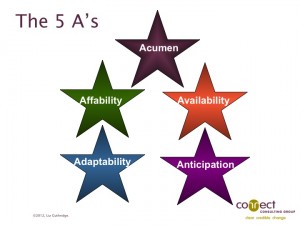 Call me the Hester Prynne of blogging.
Call me the Hester Prynne of blogging.
After my recent provocative post, Build relationships, not SME in trusted change advisor role, I should wear a Scarlet “A” for audaciousness—being absolute rather than appropriately nuanced.
To be an effective strategic advisor, you do need to have subject matter expertise; however, you don’t need to display it all the time. A colleague whom I greatly respect contacted me to provide this distinction.
Without any expertise, anyone could be a trusted advisor, she commented. And while anyone can act in a Socratic manner, they wouldn’t have any depth of knowledge to draw on as they discussed an issue. And if a leader then asked the “advisor” for ideas or counsel, the content-lite individual might not be able to respond competently, which annihilates credibility.
Yes!
With 20/20 hindsight, I should have stuck with my original headline: “Build relationships; don’t show off your subject matter expertise.”
Subject matter expertise is one instrument in a musical section—a chamber orchestra, if you will, called acumen. Acumen along with four other “A” words forms the orchestra, which contains the range of attributes that trusted strategic advisors need.
In my Strategic Action Group, we cover these attributes from the perspective of “earning the 5 A’s.” You’re not necessarily born with these attributes; instead, you need to be aware of them and make an effort to practice getting skilled at them:
- Acumen
- Anticipation
- Adaptability
- Availability
- Affability
(By the way, this Strategic Action Group is designed for communication professionals who want to become more capable, confident and credible around strategic issues so they can serve as trusted advisors. The Spring group starts March 30, and applications are now open.)
Of all the A’s, “acumen” is the most critical section. It’s all about knowledge—understanding about the business (or non-profit or government if you work in those sectors), familiarity with the organization in which you’re working, and astuteness about the area in which you’re advising—that is the subject matter expertise (SME).
For communication professionals, subject matter expertise covers communication theory and practice (including all the tactics and tools), listening, emotional intelligence, body language, influence, behavior change, and any other topics upon which you need to draw.
Competent and credible SME’s devote many hours and massive energy to get up to speed in their specialty and then to stay current. “Googling” a few topics of interest and skimming the blog posts that come up don’t count—as my colleague and I both maintain.
However, being just an SME with good relationships can’t catapult you into the advisor category. For example, even if you have extensive understanding and experience in a field—such as social media or videos—you can’t provide full value to a leader if you don’t understand his or her issues within the larger business context. That’s why you need acumen.
Leaders seek answers to solve their problems and get results that meet their goals and advance their strategies. The deep subject matter expertise you bring or the processes you use aren’t as relevant as the outcomes you produce within the context of their problem.
How do you assess your level of acumen, particularly around business issues? Ask yourself if you know the answers to these questions well enough to explain them to others:
- How does my company make money?
- What are our biggest expenses?
- Who are our biggest customers?
- What are our customers’ current concerns?
- Who are our competitors?
- How do we differ from them?
- Who are our biggest shareholders?
- Who are the industry leaders?
- What’s influencing our business and our industry in terms of the six trends that the World Future Society recommends examining? (Demographics, economics, government, environment, society and technology?)
- What metrics do we track and why? What are the lagging indicators? The leading indicators?
Depending on your particular business and industry, there may be other questions you need to ask yourself.
Once you’ve earned an “A” in acumen, you don’t need to flaunt it; however, you do want to use it.
And with solid acumen, you’re able to develop your capability and confidence in the other “A”’s. The Strategic Action Group provides you with tools, tips and techniques to help you become more adept as well as develop your own point of view.
Please do as I say though, not as I did. Being bold is good; being extreme is bad.
What do you think?

0 Comments